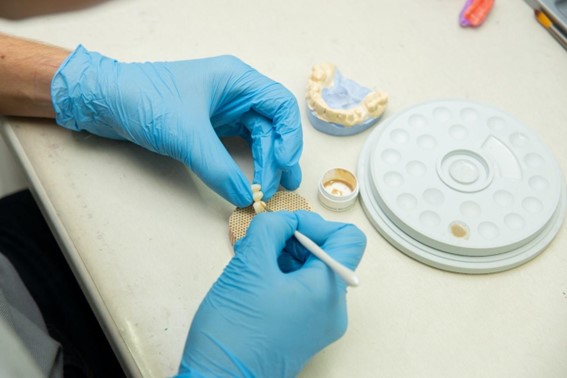False teeth: what types are there?
Are you thinking of using dentures, but you don't know where to start or what is its starting price? Without a doubt, this is one of the dental solutions oldest to date, and that is why you will find a long history of clients satisfied with its benefits.
Even so, and since you don't have to know what it consists of or what types of dentures exist, we have prepared a small guide for you. We tell you everything!
What is a denture and what is it used for?
A denture is a prosthesis responsible for replacing missing teeth or its entirety, and that can be put on and taken off according to the patients' needs. This facilitates everyday tasks, such as eating or speaking, while improving oral health.
Although it is true that there are currently more effective treatments, such as dental implants, False dentures are an alternative widely used in different cases in which it is not possible to acquire the first option.
For example, due to its economical price or for medical reasons, factors why it is more common in elderly people.

Types of dentures and their characteristics
False dentures can be differentiated into several types according to three essential factors: their composition, the material with which they are made and their way of adhering to the jaw.
- According to composition, we can find:
Partial denture
This type of denture, also called “skeletal,” is used when the patient you only need to cover certain areas of the mouth, replacing some teeth and adapting perfectly to the rest of the oral cavity, where the original pieces do exist.
Complete denture
This model, also called “mucosal-supported denture,” is designed for dentures in which completely replace the original teeth of the patient, adhering it to the patient's gum and alveolar bone.
- According to material, exist:
resin denture
It is one of the most common dentures due to its strength and durability, in addition to its low absorption of oral fluids, which makes it perfect for use for long periods of time.
Resin and metal denture
In addition to resin dentures, there is a variation in which the metal to reinforce the prosthesis through an attached structure. However, this must be evaluated after a specialist study, as it increases its weight.
porcelain denture
Finally, the most traditional is porcelain dentures, which provide a unique aesthetic value to the patient. However, this is usually harder and more rigid than those made with resin, and less resistant.
- Finally, depending on your form of accession you'll find:
Mucous-supported
This is one that, through specific products, adheres directly to the gum and to the maxillary bone after leaving a healing period.
mucodentent-supported
On the other hand, the muco-tooth-supported denture is one that is held by wires in the teeth that are still preserved.
Advantages and disadvantages of using dentures
Acquiring this type of prosthesis is an alternative that is increasingly less used in the sector due to the benefits offered with dental implants. However, there are cases in which it is necessary to opt for them, so we will tell you some of their advantages and disadvantages:
Benefits of a dental prosthesis
- Restoration of dental pieces losses to improve the patient's functionality and aesthetics.
- Process free of surgical intervention, so it is an easy adhesion without the need for recovery.
- Simple maintenance and repair against possible breakages.
- They are cheaper than implants, making it the perfect alternative for adverse economic circumstances.
Disadvantages of a dental prosthesis
- Discomfort for the patient, because the prosthesis moves and can cause injuries to the gums.
- Reduction, over time, of the alveolar bone in which the denture is held.
- El Using adhesives to keep the prosthesis fixed can generate dirt If it is not cleaned correctly every day, producing not only bad breath and taste, but also the generation of fungi.
- Possibility of breaking or get lost due to the need to put it on and take it off for proper cleaning.
- Need to remove it to go to sleep, which is a problem for many patients due to comfort and aesthetics.
How to care for false teeth?
The importance of maintaining and cleaning a dental prosthesis goes beyond simple aesthetics. It's about a routine process in which we take care of our oral health to avoid later problems with dirt, fungus or discomfort.
- Daily, recurring and thorough cleaning, to keep the dentures in the correct hygiene measures for your mouth. In the same way, use a glass of water with a specific cleansing tablet to immerse it in every night.
- Support your dental hygiene with a annual check-up by your dentist, which checks the condition of the prosthesis and your health.
- Take care of your diet, avoiding foods that are not recommended by specialists, such as very hard products or those that can stick to the gums and teeth, such as chocolate.
How much does a denture cost?
The price of a denture will depend on the type of prosthesis you want to purchase; That is, an overdenture will be more expensive than a complete one, and this more expensive than a partial one. Therefore, it is essential that, before anticipating events, Consult with your specialist the best option for you.
However, if you want to get an idea before the consultation, we tell you that the cost of false teeth It can range between 500 and 1.000 euros, an economical price if you compare in the market.
So what is the best option for me?
As we have already mentioned, the best option for your oral health It will depend exclusively on the patient and their needs., so we advise you to go to your trusted dentist to make a diagnosis.
We can do it for you through a simple and fast process. As? You only have to make your appointment online and go to our centers to receive personalized advice from our specialists.

